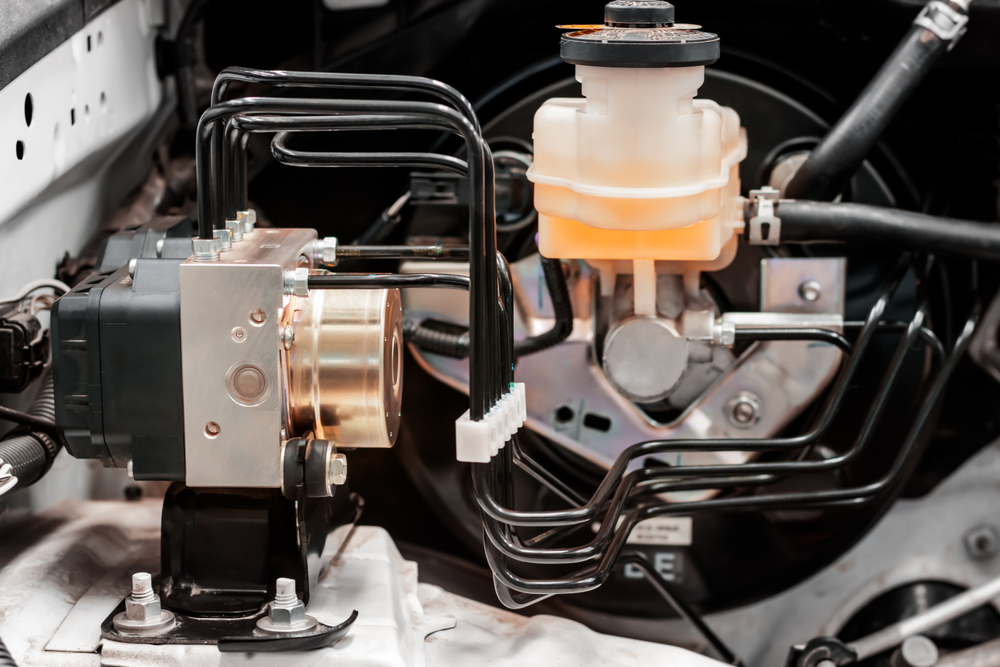We’re all taught the importance of how to break in icy or wet conditions on the road, but what if you no longer had to learn? The days of pumping your break until your car stops to prevent skidding are over! Anti-lock brakes are here to save the day, making driving safer than ever!
If you’ve recently bought a new car or have just learned to drive, the chances are that you’ve heard of the anti-lock braking system. The question is, do you know how it works?
In this blog, we will discuss what anti-lock brakes are, how anti-lock brakes work, when they take effect and what the warning light on your car means.
If you’re looking for car maintenance or repairs, get in touch with Kinghams Croydon today.
What does an anti-lock brake system mean?
The anti-lock brake system is designed to keep you safe in wet or icy conditions by stopping your car when you brake sharply. If you are travelling at speed and take a sharp break without ABS, your wheels could stop, resulting in the car losing traction and the driver unable to steer properly. ABS makes this danger less likely to occur.
How does the anti-lock brake system work?
Anti-lock brake systems work by being able to detect how quickly each wheel is rotating and the rate of acceleration and deceleration. Some cars use an electronic stability control in order to do this, yet an anti-lock braking system can be done without this element.
The antilock braking system will activate when the wheels are about to lock by sensing how harshly the driver brakes. The antilock braking system will then rapidly reduce and increase the braking pressure multiple times per second applying the correct amount of pressure for the force in which you are braking the car.
This system allows the car to slow down, yet keep the wheels moving which gives the driver more control when steering and makes it less likely that the car will skid to a halt.
There are four different components to an anti-lock brake system:
- Speed sensors – These detect and tell the system that there is a problem with the braking.
- Valves – If the pressure in the brake line is too high, the valves will relieve some of the pressure for a safer drive.
- Pump – If a valve releases pressure in the brake line, the pump will then increase the pressure again. This process will repeat, creating the same pumping motion that you would if your car didn’t have an anti-lock braking system.
- Controller – This is a computer in the car which monitors the speed sensors to control the valves.
When do anti-lock braking systems work?
Anti lock braking systems will only activate when the user brakes harshly. For example, if the driver completed an emergency stop. If you learned to drive in a modern car, when producing the emergency stop, you may have felt the car judder, this is the anti-lock braking system taking effect.
In what circumstances does the anti-lock braking system take effect?
The anti-lock braking system is most effective on dry and solid road surfaces to ensure that the driver has maximum control over the car, whilst maintaining control over the vehicle. The system has the ability to be able to increase overall stopping distances as it repeats the same braking method during small intervals. In slippery conditions, the braking system will work less effectively, although it will still be able to work, just not as well.
What does the anti-lock braking system warning light mean?
The braking system warning light will come on due to an array of different problems with the system. You can check in your car handbook to look at the specific light which is on and what it means to get a more accurate description. If the ABS light comes on, it means that the system is not working properly and needs to be fixed. This may also affect other systems in your car such as traction control and stability control. It’s worth noting that if your ABS light comes on, your car will fail its MOT. Don’t worry, it’s usually safe to drive if your ABS light does come on, but its best to get your car checked out as soon as possible. On the other hand, if you hear any strange noises coming from the wheels it could be unsafe to drive.
Thank you for reading our blog ‘What are anti-lock brakes’. If you need to get your car repaired, get in touch with Kinghams Croydon today.



Leave a Reply